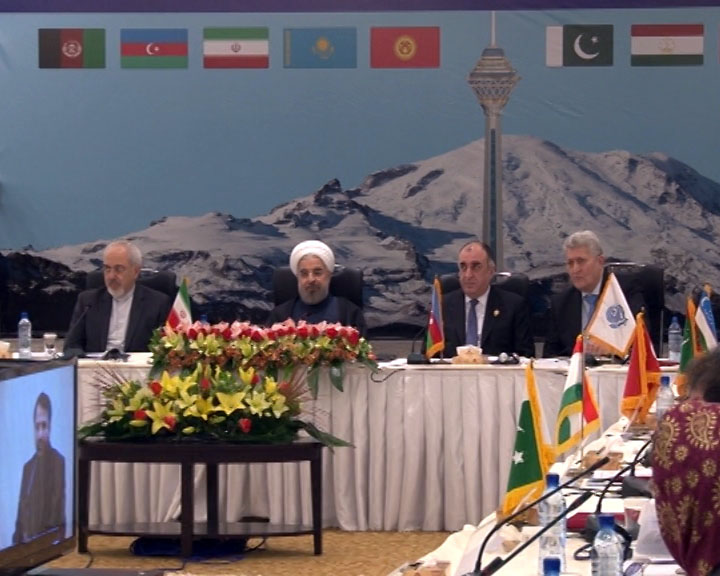Azerbaijan passes presidency of ECO to Iran (UPDATE)

By Nazrin Gadimova
21st Meeting of the Council of Ministers of the Economic Cooperation Organization (ECO) was held in Tehran on November 24-26.
The meeting brought together foreign ministers of Iran, Turkey, Kyrgyzstan, Afghanistan, and Azerbaijan and representatives of Pakistan, Turkmenistan, Kazakhstan, Uzbekistan, and Tajikistan.
Azerbaijan's Foreign Minister Elmar Mammadyarov noted in his opening remarks that the Presidency of the ECO Council of Ministers was passed to Iran from Azerbaijan.
Speaking about ECO's recent achievements, Mammadyarov emphasized the development of regional integration.
"We are very pleased to observe that regional integration efforts are deepening in terms of increased trade and investment flows, commercial ties, and intra-regional transport infrastructure development," he said. "These are promising signs, but we need to build on them further and explore other mutual economic opportunities."
The minister also said regional infrastructure development should remain a priority for cooperation.
"In particular, ECO should aim at the modernization of railway routes and related infrastructure, as well as the creation of a common railway network and its interconnection with European and Middle East networks. The early completion of the ongoing railway projects of regional importance, including Qazvin-Rasht-Astara (Iran) - Astara (Azerbaijan) will create new attractive transit opportunities for countries of the region," he said.
"In this regard, we welcome holding the second meeting of the high-level working group on this project, which was held recently, and hope that those meetings will serve as a useful platform for generating effective outcomes. We thank the ECO Secretariat for its efforts and support in realizing this project," Mammadyarov said.
Azerbaijan's Foreign Minister said Azerbaijan supports reforms being carried out in ECO to transform the organization into an effective structure.
"Today ECO member-countries are known worldwide for their dynamic economies, improved business climates, as well as making competitive and innovative efforts," he said. "The organization's member-countries need to develop cooperation and find new opportunities for future joint activities."
Touching upon regional conflicts and the Armenian-Azerbaijani Nagorno-Karabakh conflict, Mammadyarov said ECO will not be able to benefit from comprehensive regional cooperation without resolving protracted conflicts and ensuring regional security and stability.
"Unfortunately, in some cases we do not pay sufficient attention to these issues," Mammadyarov said.
According to the minister, the South Caucasus region suffers from protracted conflicts.
Mammadyarov also said that the Armenian-Azerbaijani Nagorno-Karabakh conflict is still the main source of instability and prevents full-scale regional development and regional cooperation.
He said conditions for the beneficial development of all sides can be created through restoring the sovereignty, territorial integrity and internationally recognized borders of Azerbaijan.
"ECO is a strong organization and our task is to combine efforts to ensure regional cooperation and strengthen the authority of the participating countries in their regions," Mammadyarov said.
Addressing the meeting, Iranian President Hassan Rouhani highlighted benefits that the expansion of ECO's activities can bring to the member states.
Rouhani said that rapprochement and cooperation within ECO is the best way to protect member-countries from the world economic crises of recent years.
According to the Iranian president, the favorable geographical location of the ECO member-countries and the fact that there are North-South and East-West transport corridors in these countries strengthens the belief that ECO will be a larger and more influential structure in the future.
"Close cooperation between ECO member-countries in the past 20 years will be the foundation for their future relations," Rouhani said.
The president said the current level of cooperation among ECO member-countries is unsatisfactory, noting the need for further development of relations.
"If ECO member-countries expand trade ties, it will give an impetus to their development and create conditions for investment in these countries," he said.
The report of the ECO Council of Ministers and the Tehran communiqué were adopted during the event.
The communiqué featured the establishment of the Economic Research Center of the ECO and the approval of its regulations with headquarters in the Azerbaijani capital of Baku.
The center will carry out researches on the economic development of ECO member states, implement economic projects, and propose new economic models.
ECO, an intergovernmental regional organization established in 1985 by Iran, Pakistan and Turkey, provides a platform to promote economic, technical, and cultural cooperation among member states.
The organization was expanded in 1992 to include seven new members, including Afghanistan, Azerbaijan, Kazakhstan, Kyrgyzstan, Tajikistan, Turkmenistan, and Uzbekistan.
